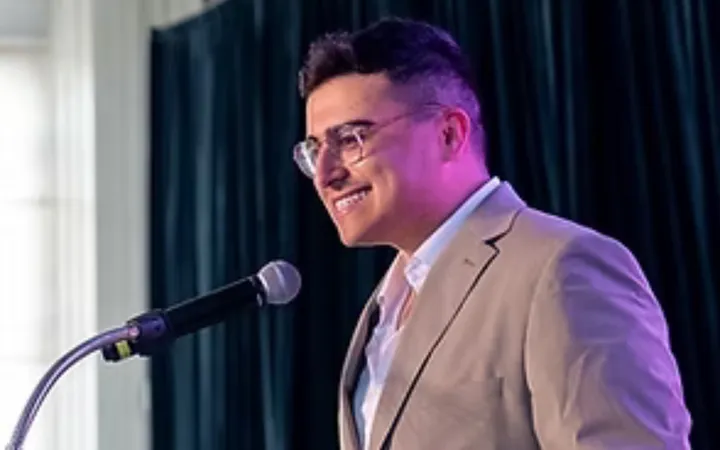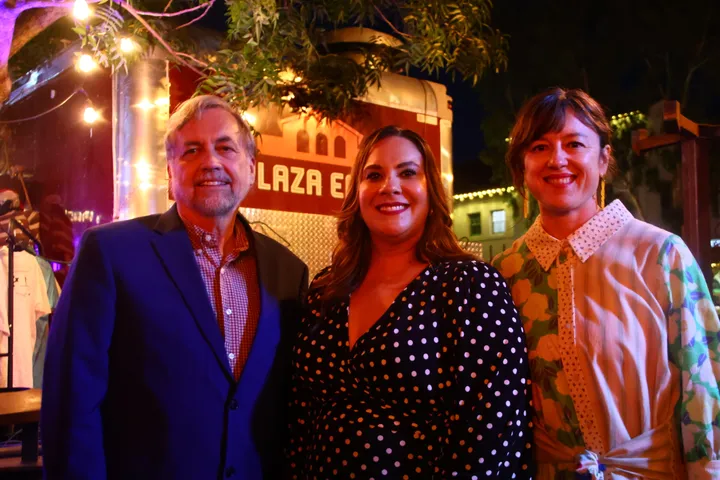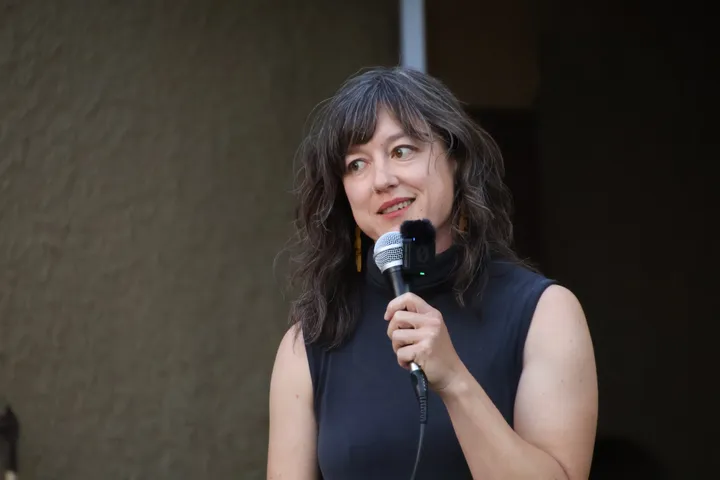Shaw pushes for infrastructure, housing reforms in Ward 3
Sadie Shaw is challenging incumbent Kevin Dahl in the Ward 3 City Council Democratic primary, campaigning on infrastructure improvements, housing solutions and greater transparency in city spending.
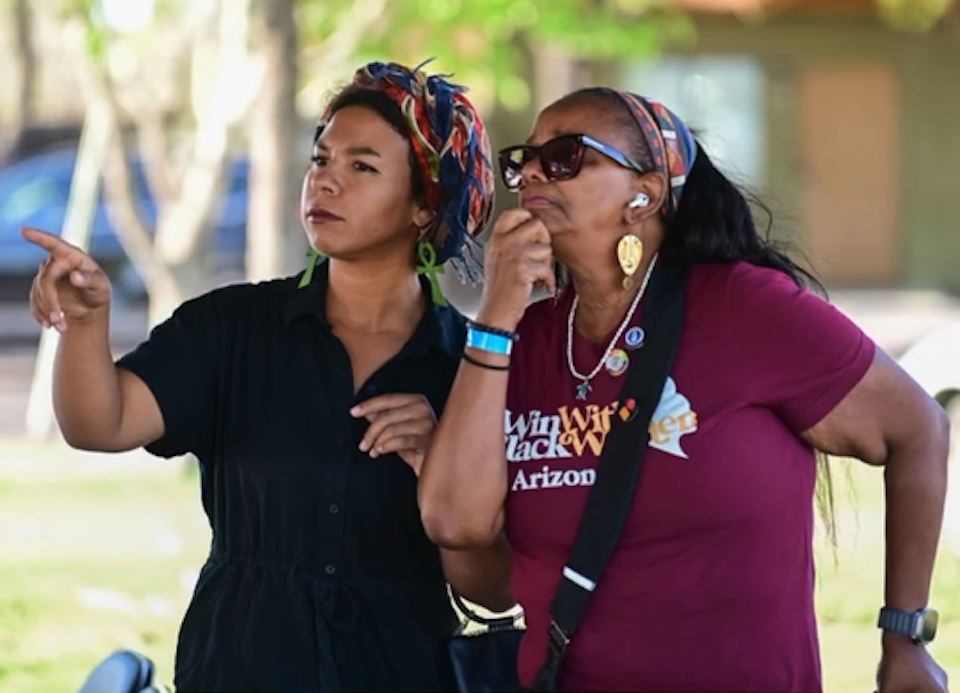
Sadie Shaw, a Tucson Unified School Board member, is challenging Ward 3 incumbent Kevin Dahl in the Democratic primary with a campaign focused on infrastructure, housing and city spending.
Shaw is the youngest candidate in the Ward 3 race, and she believes her grassroots approach could reshape Tucson’s future. She’s harnessing the power of social media to connect with young voters, mobilize volunteers for door-to-door canvassing and spread the word about upcoming fundraisers.
Shaw says the momentum behind her campaign could be critical in the Aug. 5 primary, where the winner will advance to face Janet “JL” Wittenbraker in the November general election.
And while Dahl has racked up plenty of endorsements from local leaders, Shaw seems unfazed by her competition.
“You won’t see me posting about endorsements from politicians, because I’m not seeking them,” Shaw wrote in a post on Instagram. “I’m seeking support from everyday people, not the powerful few.”
Shaw has been endorsed by the American Federation of State, County and Municipal Employees, a union representing many city employees, and Tucson’s chapter of the Democratic Socialists of America, who praised her as a candidate rooted in Tucson working-class communities.
“In addition to her policies, Sadie represents the best of Tucson’s working-class communities,” Tucson DSA wrote on Instagram. “She has shown herself as a politician who cares about her constituents and we know she will continue to do so after replacing Kevin Dahl as Ward 3 council member.”
A graduate of Amphitheater High School, Shaw earned a degree in arts and visual culture education from the University of Arizona in 2019.
She serves as vice president of the Sugar Hill Neighborhood Association and is the second-ever African American woman elected to the Tucson Unified School District’s governing board. She’s also a mother and works as the public arts and community design administrator at the Arts Foundation for Tucson and Southern Arizona.
If elected to the city council, the City Charter requires that she give up her position on the TUSD board.
Shaw, who grew up in Tucson, told Tucson Spotlight she’s tired of seeing communities like hers overlooked. Her campaign promises to bring more equitable city investments to historically underserved areas.
Shaw, reflecting on her upbringing in Sugar Hill, said infrastructure in her neighborhood and others in Ward 3 reflects a long history of neglect.
Shaw said parks, roads and sidewalks are long overdue for investment, pointing to long-neglected projects on Limberlost and Roger roads.
“These roads have been terrible for the last 20 years,” she said. “I think it’s unfortunate that all of the improvements are finally happening during an election year.”
She advocates for better street lighting, smoother sidewalks and protected bike lanes, highlighting how aging roads and cracked sidewalks isolate seniors and people with disabilities.
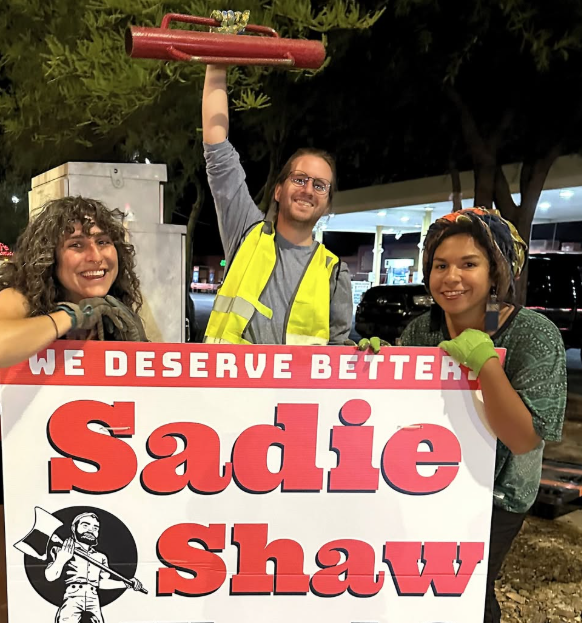
Shaw is concerned not only about roads but also about increasing tree canopy in walkable areas. She supports shaded sidewalks and follows up on past projects to ensure newly planted trees survive.
She said Tucson’s response to extreme heat is falling short, pointing to the recent closure of Santa Rita Park, where many unhoused residents previously found shade in the face of triple-digit temperatures.
“The downtown library… if you go there any day during the week, the whole bottom floor is packed full with people who seem to be just needing a place to sit down and keep cool,” Shaw said. “Unfortunately, the downtown library is closed on the weekend. That’s one of the places that I think we need to designate as a cooling center again.”
One of Shaw’s top concerns is the housing crisis and the city’s approach to unhoused residents. She says current efforts aren’t working and it’s time to change course. If elected, she wants the city to collaborate closely with trusted mutual aid groups that already have relationships with people living on the streets.
She also supports transforming vacant city-owned spaces into designated safe outdoor spaces, with resources like showers, bathrooms and shade structures to escape the brutal heat.
This effort goes beyond solar panels; she is striving for true climate resilience, and her innovative ideas could change how local homes are built. She reflected on old desert traditions and encouraged others to reconsider building materials, suggesting alternatives like adobe and earth-integrated homes inspired by techniques used by tribes such as the Hohokam.
“The Sugar Hill Community Land Trust is currently in the works to build housing that is climate resilient (based on) what has been done here in the past,” Shaw said.
When it comes to city spending, Shaw aims to increase transparency and redirect resources to support long-term community well-being.
That includes auditing the Tucson Police Department’s budget and cutting duplicate services that exist within the city and county. She said this will free up funds to redirect to programs that address social issues officers are often left to deal with.
“There is a shortage of staff in TPD and crime is by and large, on the rise,” she said. “The root cause of crime is typically poverty, trauma, addiction, and just the lack of opportunities.”
One major concern resulting from the loss of federal funding is the city’s ability to maintain fare-free transit. Shaw, a former bus rider, supports keeping public transit free, recalling that she once relied on the bus to get around.
“It was very difficult at times to pay for, you know, my daily ride,” Shaw said. “It adds up, you know, if you have to ride all throughout the day or get a day pass or you have your child.”
If the city decides to restore fares, Shaw says discounted or free passes should remain available for those who need them, with easy qualification requirements.
Shaw is attentive to bus drivers’ concerns, expressing worry about their safety from dangerous passengers. She proposed assigning a support worker or outreach staff to each bus to help deescalate situations.
If elected, her goal will be simple: speak up, especially for those who feel unheard.
Shaw said she’s not running just to win, but to shift priorities and give overlooked neighborhoods a real voice in City Hall.
Angelina Maynes is a University of Arizona alum and reporter with Tucson Spotlight. Contact her at angelinamaynes@arizona.edu.
Tucson Spotlight is a community-based newsroom that provides paid opportunities for students and rising journalists in Southern Arizona. Please consider supporting our work with a tax-deductible donation.

